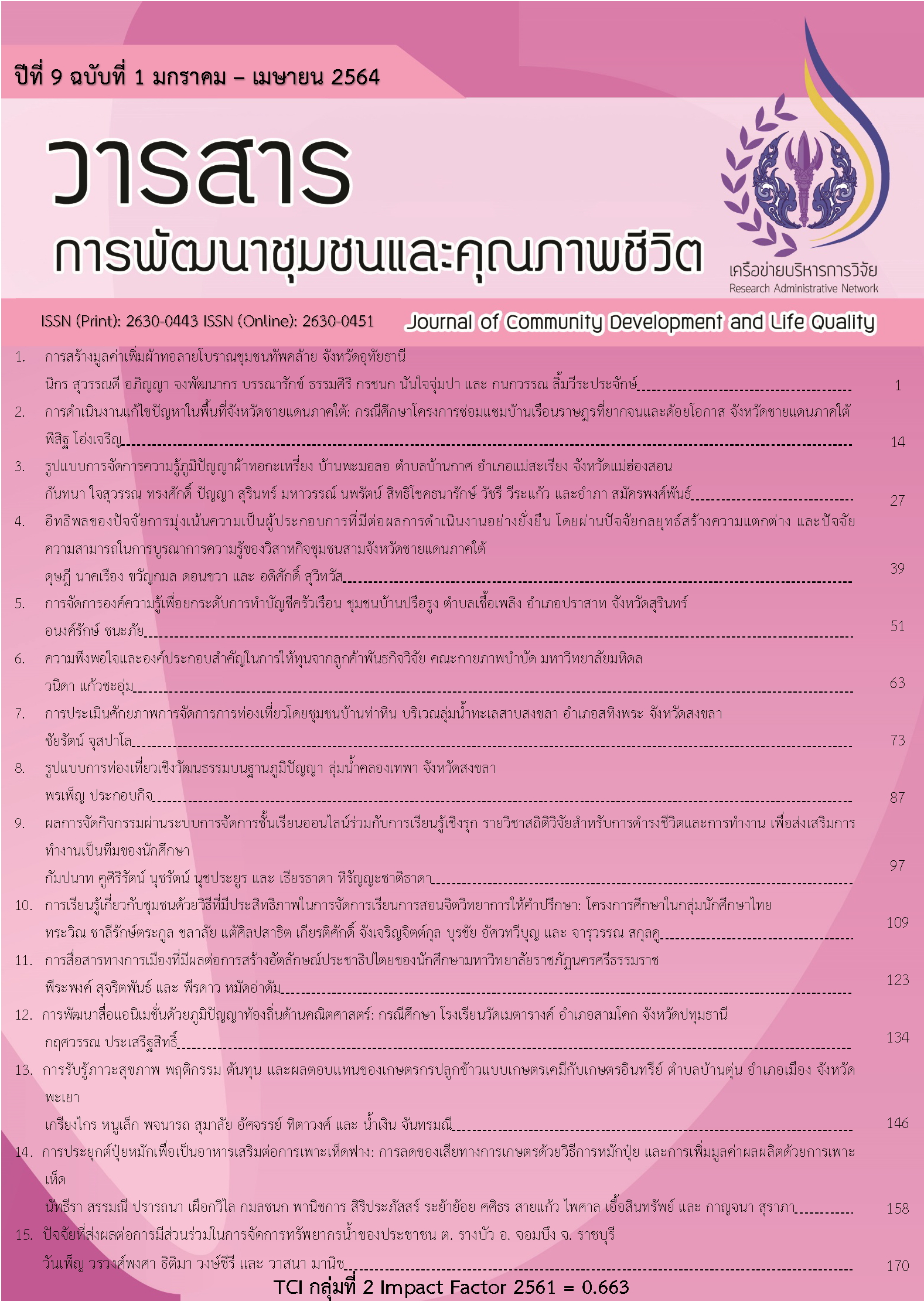อิทธิพลของปัจจัยการมุ่งเน้นความเป็นผู้ประกอบการที่มีต่อผลการดำเนินงานอย่างยั่งยืน โดยผ่านปัจจัยกลยุทธ์สร้างความแตกต่าง และปัจจัยความสามารถในการบูรณาการความรู้ของวิสาหกิจชุมชนสามจังหวัดชายแดนภาคใต้
Main Article Content
บทคัดย่อ
การวิจัยเรื่องนี้วัตถุประสงค์เพื่อพัฒนาแบบจำลองสมการโครงสร้างของอิทธิพลของปัจจัยการมุ่งเน้นความเป็นผู้ประกอบการที่มีต่อผลการดำเนินงานอย่างยั่งยืน โดยผ่านปัจจัยกลยุทธ์สร้างความแตกต่าง และปัจจัยความสามารถในการบูรณาการความรู้ ทำการสุ่มตัวอย่างแบบหลายขั้นตอนจากวิสาหกิจชุมชนในสามจังหวัดชายแดนภาคใต้จำนวน 384 กลุ่ม โดยใช้แบบสอบถามและวิเคราะห์ข้อมูลด้วยแบบจำลองสมการโครงสร้าง โดยโมเดลมีความสอดคล้องกับข้อมูลเชิงประจักษ์ในระดับดี ( 2 = 189.09, df = 71, RMSEA = 0.066, SRMR = 0.011, CFI = 0.95) ผลการวิจัย พบว่า การมุ่งเน้นความเป็นผู้ประกอบการมีอิทธิพลทางตรงเชิงบวกต่อกลยุทธ์การสร้างความแตกต่างและความสามารถในการบูรณาการความรู้ อย่างมีนัยสำคัญทางสถิติที่ระดับ 0.01 โดยมีค่าสัมประสิทธิ์อิทธิพลเท่ากับ 0.96 และ 0.92 ตามลำดับ นอกจากนี้การมุ่งเน้นความเป็นผู้ประกอบการมีอิทธิพลทางอ้อมต่อผลการดำเนินงานอย่างยั่งยืน โดยผ่านความสามารถในการบูรณาการความรู้ โดยมีค่าสัมประสิทธิ์อิทธิพลเท่ากับ 0.70
Article Details
กองบรรณาธิการขอสงวนสิทธิ์ในการตรวจและแก้ไขบทความที่เสนอเพื่อตีพิมพ์ในวารสารการพัฒนาชุมชนและคุณภาพชีวิต
บทความหรือข้อความคิดเห็นใด ๆ ที่ปรากฏในวารสารการพัฒนาชุมชนและคุณภาพชีวิต เป็นวรรณกรรมของผู้เขียนโดยเฉพาะคณะผู้จัดทำไม่จำเป็นต้องเห็นด้วย และไม่ใช่ความรับผิดชอบของมหาวิทยาลัยและคณะผู้จัดทำ / บรรณาธิการ
เอกสารอ้างอิง
Atalaya, M., N. Anafarta and F. Sarvanc. 2013. Understanding the relationship between stakeholder pressure and sustainability performance in manufacturing firms in Pakistan. Procedia - Social and Behavioral Sciences 75: 226–235.
Boonsawang, A., J. Buakaew and V. Rungreunganun. 2018. The study of entrepreneurs demand issues for products and packaging development in 5 southern border provinces. Pp.11-20. In: Proceeding of the First National Conference on Humanities and Social Sciences: Wisdom Power For Sustainable Development at Songkhla Rajabhat University, Songkhla. (in Thai)
Cantele, S. and A. Zardini. 2018. Is sustainability a competitive advantage for small businesses? An empirical analysis of possible mediators in the sustainability - financial performance relationship. Journal of Cleaner Production 182: 166-176.
Cui, L., D. Fan, F. Guo and Y. Fan. 2018. Explicating the relationship of entrepreneurial orientation and firm performance: Underlying mechanisms in the context of an emerging market. Industrial Marketing Management 71: 27-40.
Courrent, J.M., S. Chasse and W. Omri. 2018. Do entrepreneurial SMEs perform better because they are more responsible? Journal of Business Ethics 153(2): 317–336.
Donkwa, K. 2013. Macroeconomics 1. 2nd ed. Charansanitwong, Bangkok.
Elkington, J. and J. Zeitz. 2014. The Break-Through Challenge: 10 Ways to Connect Today’s Profits with Tomorrow’s Bottom Line. Jossey- Bass, San Francisco, CA.
Fitzsimmons, J.A. and M.J. Fitzsimmons. 2004. Service Management: Operations, Strategy, and Information Technology. 4th ed. McGraw-Hill, New York.
Ha, S.T., M.C. Lo and Y.C. Wang. 2016. Relationship between knowledge management and organizational performance: A test on SMEs in Malaysia. Procedia - Social and Behavioral Sciences 224: 184 – 189.
Hair, J.F., W.C. Black, B.J. Babin, and R.E. Anderson. 2010. Multivariate Data Analysis A Global Perspective. 7th ed. Pearson education Inc, New Jersey
Ivanov, C.I. and S. Avasilcăi. 2014. Measuring the performance of innovation processes: A balanced scorecard perspective. Procedia - Social and Behavioral Sciences 109: 1190–1193.
Jiang, W., H. Chai, J. Shao and T. Feng. 2018. Green entrepreneurial orientation for enhancing firm performance: A dynamic capability perspective. Journal of Cleaner Production 198: 1311-1323.
Josien, L. 2012. Entrepreneurial orientation: An empirical study of the risk-propensity dimension of entrepreneurs. Academy of Entrepreneurship Journal 8(1): 21-34.
Kaplan, R. S. and D.V. Norton. 1996. Strategic learning and the balanced scorecard. Strategy and Leadership 24(5): 18-24.
Kim, Y.J. and G.L. Sanders. 2002. Strategic actions in information technology investment based on real option theory. Decision Support Systems 33(1): 1–11.
Kim, Y.J., S. Song, V. Sambamurthy and Y.L. Lee. 2012. Entrepreneurship, knowledge integration capability, and firm performance: An empirical study. Information Systems Frontiers 14(5): 1047–1060.
Kline, R.B. 2011. Principles and Practice of Structural Equation Modeling. 3rd ed. The Guilford Press, New York.
Li, Y.H., J.W. Huang and M.T. Tsai. 2009. Entrepreneurial orientation and firm performance: The role of knowledge creation process. Industrial Marketing Management 38(4): 440–449.
Mettathamrong, J., C. Phromket, and K. Vichasilp. 2019. Analysis of a confirmatory factor model of community enterprise management in Sakon Nakhon province to Thailand 4.0. Journal of Community Development and Life Quality 7(3): 249-260.
Mu, J., E. Thomas, G. Peng and A. Di Benedetto. 2017. Strategic orientation and new product development performance: The role of networking capability and networking ability. Industrial Marketing Management 64: 187–201.
Office of the National Economic and Social Development Council. 2019a. The twelfth national economic and social development plan. (Online). Available: https://www.nesdc.go.th/e wt_dl_link.php?nid=6422 (August 28, 2019) (in Thai)
Office of the National Economic and Social Development Council. 2019b. Gross regional and provincial product chain volume measures 2017 edition. (Online). Available: https://www.nesd c.go.th/ewt_dl_link.php?nid=5628&filename=gross_regional (August 29, 2019) (in Thai)
Porter, M.E. 2003. The economic performance of regions. Regional Studies 37(6-7): 549-578.
Prajogo, D.I. 2016. The relationship between competitive strategies and product quality. Industrial Management and Data Systems 107(1): 69–83.
Rovinelli, R.J. and R.K. Hambleton. 1977. On the use of content specialists in the assessment of criterion-referenced test item validity. Dutch Journal of Educational Research 2: 49-60.
Ryu, C., Y.J. Kim, A. Chaudhury and H.R. Rao. 2005. Knowledge acquisition via three learning processes in enterprise information portals: Learning-by-investment, learning-by-doing, and learning-from-others. MIS Quarterly 29(2): 245–278.
Salunke, S., J. Weerawardena and J.R. McColl-Kennedy. 2019. The central role of knowledge integration capability in service innovation-based competitive strategy. Industrial Marketing Management 76: 144-156.
Semuel, H., H. Siagian and S. Octavia. 2017. The effect of leadership and innovation on differentiation strategy and company performance. Procedia - Social and Behavioral Sciences 237: 1152–1159.
Wolff, J.A., T.L. Pett and J.K. Ring. 2015. Small firm growth as a function of both learning orientation and entrepreneurial orientation: An empirical analysis. International Journal of Entrepreneurial Behavior and Research 21(5): 709-730.
Zehir, C., E. Can and T. Karaboga. 2015. Linking entrepreneurial orientation to firm performance: The role of differentiation strategy and innovation performance. Procedia - Social and Behavioral Sciences 210: 358–367.


